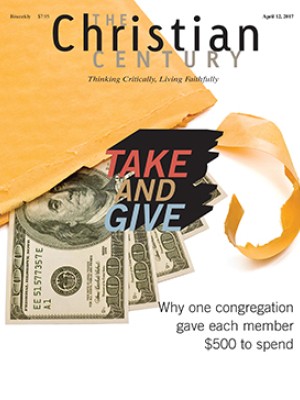Life together as an empire collapses
If Benedict’s Rule is a text of resistance, what does it help us resist?

In a course that I’m teaching on Christian spirituality, my students and I have felt ourselves directly addressed by everything we’ve read, from medieval commentaries and sermons to visionary literature, from prison letters to autobiographies. The power of these texts to speak to readers is nothing new. What feels new is the sound of their voices in this particular moment.
My students and I notice that bits and pieces of our reading have been turning up in newspaper articles and editorials. In February, New York Times columnist David Brooks explored models of resistance to the Trump administration, some drawn from the literature of Christian spirituality. If the primary threat is authoritarian, Brooks argued, then we are in a Bonhoeffer moment, and the best course is direct action in the streets. If the threat is corruption, then we are in a St. Benedict moment and must keep our heads down and our hands busy creating new forms of community until this wave of barbarism has passed. If the threat is chaos born of incompetence, as Brooks believes, then we’re in a Gerald Ford moment, one that calls for public servants who are committed to restoring the norms of governance that the Trump administration has been aggressively shredding.
Read our latest issue or browse back issues.
Gerald Ford is not on my syllabus, but Bonhoeffer and Benedict are. Benedict, in fact, is the man of the hour. Several of my students have read about him in publications like the Wall Street Journal and the Atlantic. What has he captured so our imagination in this moment?
Perhaps it’s that he is able to think practically about how to live faithfully in the midst of chaos. Benedict wrote his Rule for monasteries as the Roman Empire was staggering to its end and armies were sweeping toward Rome from the east and the north. For Benedict and his brothers, there was much to fear.
Even so, Benedict’s Rule calls for communities that are less defended than some contemporary readers imagine. Author Rod Dreher sees the “Benedict Option” as a way for conservative Christians to protect a certain kind of Christian culture in the wake of the Supreme Court’s decision to guarantee the right to marry to same-sex couples. Benedict’s Rule is less concerned with locking the gates against the hordes and more concerned with leaders who can hold power without misusing it, more concerned with study and prayer, with the relinquishment of worldly rank and private property, and with the cultivation of humility, mercy, and forgiveness. It is also deeply concerned with welcoming guests—welcomed, Benedict writes, as if they were Christ himself. Benedict does offer a special word of welcome to fellow Christians, but he also insists that all who present themselves be welcomed with honor—and especially “poor people and pilgrims, because in them more particularly Christ is received.”
If Benedict’s Rule is a text of resistance, what is it that it helps us resist? Can a rule that receives each stranger as Christ really serve as a brick in a wall intended to keep LGBT people and their influence on the outside, as Dreher suggests? What happens to the LGBT people on the inside? What about the LGBT children born into such communities?
My students and I spent a morning talking with a monk about what it’s like to have one’s life governed by a monastic rule. We discussed monasticism in its origins as a kind of resistance movement—a history that Brooks and Dreher also invoke. We asked the brother if he thought monasticism, at this moment in history, retained that quality of resistance to the status quo.
He replied that he lived his vocation as a form of resistance, not by keeping certain people outside the walls, but by welcoming people in. When you open space for people to encounter the mystery of their creation in the image of God, they become more finely attuned to the dignity of others. For him, the monastery is not a refuge from the world but a community that bears witness to the sacredness of our common humanity, a place where anyone can, by sharing in the monks’ prayer, silence, study, and community life, become formed for the mercy, humility, and forgiveness that’s at the heart of Benedict’s project.
Our country is developing policies that categorize people by religion and country of origin, deny safety to refugees, and render the vulnerable more vulnerable. The Rule of St. Benedict offers a path of resistance, but not by offering us a place to ride out the culture wars. The threats that Brooks names are real: authoritarianism, corruption, and chaos. Beneath them all, though, is the most basic threat of all: the diminishment of human dignity. This puts us in a Benedict moment. We need to see and welcome the stranger as Christ, and Benedict can teach us. From the chaos of the sixth century, he reminds us that God is waiting for us to translate what we learn into action.
A version of this article appears in the April 12 print edition under the title “A text of resistance”






